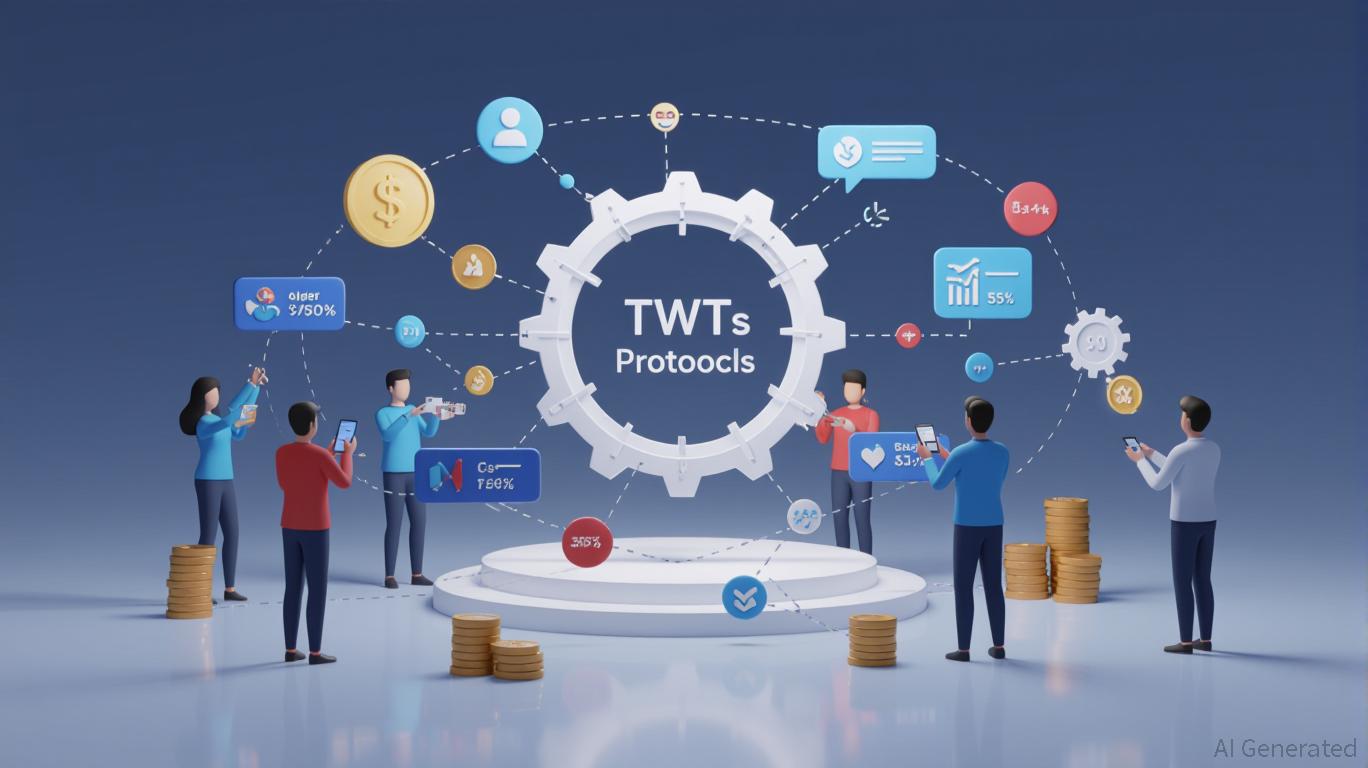TWT's 2025 Tokenomics Framework: Pioneering a Utility-Focused Approach to Value Generation in Web3
- Trust Wallet Token (TWT) 2025 model shifts from speculative hype to utility-driven value creation via ecosystem integration and user incentives. - TWT enables gas discounts, loyalty rewards, and governance rights, tying token value to active platform usage and adoption growth. - Supply constraints and burn events (88.9B tokens burned) create scarcity, contrasting inflationary DeFi models that risk devaluation. - Governance and cross-platform DeFi integration position TWT as a versatile asset, aligning us
Utility at the Heart of Value Generation
The 2025 iteration of TWT emphasizes rewards based on utility, shifting the token’s role from a speculative instrument to a practical asset for both users and developers.
One notable advancement is the reduction of gas fees. Users can acquire TWT without incurring gas costs and use it to offset transaction expenses elsewhere, making blockchain entry more accessible for newcomers. This feature not only improves the user journey but also encourages holding TWT, since larger balances unlock further discounts and governance options.

Managing Supply and Burn Events to Prevent Devaluation
The supply strategy for TWT further strengthens its long-term value. Soon after its introduction in 2020, a massive 88,999,999,900 TWT were permanently removed from circulation, creating scarcity and demonstrating a commitment to deflationary practices
The tiered loyalty program within Trust Premium illustrates this philosophy. Rather than issuing additional tokens, rewards are limited and linked to user engagement, such as staking or on-chain activity. By steering clear of inflationary incentives, TWT reduces dilution risks and builds a community that actively supports ecosystem growth
Transforming Value Capture in DeFi
Many traditional DeFi frameworks focus on short-term liquidity at the expense of lasting utility, resulting in unstable token prices. TWT’s 2025 model reverses this by embedding value in user participation. For example, TWT can serve as collateral in various DeFi platforms, broadening its use beyond Trust Wallet’s core offerings. This interoperability increases demand, as users seek TWT for both its discounts and its versatility across the DeFi landscape
Additionally, TWT’s governance function gives holders a voice in the platform’s direction. By distributing decision-making power, Trust Wallet builds community confidence and aligns the interests of developers and users. As noted in Bitget’s 2025 report, this governance structure reinforces TWT’s dual role as both a utility and governance token, setting it apart from tokens driven solely by speculation
Conclusion: Setting the Standard for Sustainable Tokenomics
The 2025 tokenomics design for TWT marks a significant shift in how Web3 projects approach value generation. By focusing on practical use, controlled supply, and user-led growth, Trust Wallet has built a system where TWT’s value is fundamentally linked to the ecosystem’s vitality. For investors, this presents a strong case: a token that becomes more valuable as adoption rises, rather than losing worth due to inflation or lack of engagement.
As the Web3 sector advances, those projects that successfully combine innovation with sustainability will lead the way. TWT’s strategy—anchored in tangible utility and community-driven governance—positions it as a progressive asset in an industry increasingly shaped by substance over speculation.
Disclaimer: The content of this article solely reflects the author's opinion and does not represent the platform in any capacity. This article is not intended to serve as a reference for making investment decisions.
You may also like
Trump Alleges BBC Engaged in "Dishonesty" in $5 Billion Libel Case Regarding Altered Speech
- Trump sues BBC for $1B–$5B over edited 2021 speech, claiming it falsely portrayed him as inciting Capitol riot. - BBC apologized for "judgment error" but refused compensation, asserting no legal basis for defamation claims. - BBC's director-general and news head resigned amid political backlash, while UK officials defended its journalistic integrity. - Legal experts debate viability, with BBC arguing the U.S.-unbroadcast edit was unintentional; Trump claims "overwhelming harm." - Critics fear taxpayer-fu

Conflicting Strategies and Stalemates Worsen the U.S. Housing Affordability Problem
- A real-estate executive warns post-pandemic interventions entrenched housing unaffordability for a generation, worsening structural cost issues. - Democrats leverage affordability as a political issue, contrasting Trump's 50-year mortgage proposals with concerns over favoring lenders over households. - Treasury Secretary Bessent prioritizes financial market stability to support affordability, while Dallas FHLB allocates $8.7M for storm-resistant affordable housing. - Fed Chair Powell emphasizes cautious

Hyperliquid (HYPE) Price Fluctuations: Changing Market Sentiment During DeFi Liquidity Developments
- Hyperliquid (HYPE) faced 2025 liquidity crises from market manipulation and API outages. - November POPCAT spoofing caused $4.5M+ bad debt via leveraged position attacks. - July API outage exposed centralized infrastructure risks during $14.7B open interest. - TVL surged to $2.15B despite whale-driven volatility and anchoring bias effects. - Investors must balance DeFi innovation with systemic risks in fragile liquidity pools.

Uniswap News Today: Uniswap's CCA Makes Token Launches More Accessible, Reducing Whale Influence
- Uniswap v4 launches Continuous Clearing Auctions (CCA), a permissionless protocol for transparent, community-driven token launches with Aztec. - CCA divides token sales into blocks settled at market-clearing prices, reducing volatility and sniping while enabling equitable distribution. - The protocol automatically seeds liquidity post-auction and supports privacy via Aztec's ZK Passport, marking a DeFi innovation in fair token distribution. - CCA aims to standardize on-chain price discovery, countering w
